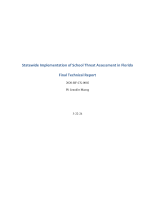Persons with disabilities
Elevated Odds of Dating Violence Among US Youth with Mental Health and Neurodevelopmental Conditions: Estimates from a Nationally Representative Cross-Sectional Study
American With Disabilities Act and Criminal Justice: Providing Inmate Services
Intellectual Ability and Sexual Recidivism Risk Assessment: Comparing Predictive Accuracy in an Incarcerated US Sample
Statewide Implementation of School Threat Assessment in Florida, Final Technical Report
Jury Deliberations of Child Witnesses with Autism Spectrum Disorder
What about us? Formative evaluation of forensic nursing program delivery of intimate partner violence medical forensic examinations
Expansion of University of South Florida's BRIGHT Project to Combat Human Trafficking
Understanding the Impact of COVID-19 on Victim Services
The COVID-19 pandemic had a detrimental impact on communities across the nation and significantly affected various aspects of individuals’ lives. One of the negative impacts was an increase in gender-based violence accompanied by shifting barriers to accessing services and support. Victims and victim service providers faced various challenges dealing with the increase in need for services, navigating barriers to help-seeking, and addressing logistical issues.
See the YouTube Terms of Service and Google Privacy Policy
Youth Bias-Based Victimization: Comparing Online Only, In-Person Only, and Mixed Online/In-Person Incidents
Prescription Opioid Resiliency and Vulnerability: A Mixed-Methods Comparative Case Study
Increased Prescribing of Psychotropic Drugs or School-Based Services for Children with Disabilities? Associations of These Self-control-Boosting Strategies with Juvenile Violence at the State Level
Threat Assessment and Disparities in School Discipline
A State Mandated School Threat Assessment. Here’s What It Meant for Students
911, What's Your Emergency?: Factors Impacting Call Coding
Inclusive Research: Engaging People Closest to the Issue Makes for Better Science & Greater Impact; 2023 NIJ Research Conference Plenary
This panel will discuss what inclusive research is, how to conduct it, and what issues and challenges exist about engaging in it. “Inclusive research” has its history as a participatory research method designed to ensure people closest to the issue or problem under study are authentically engaged in the research process rather than simply being “research subjects.” While community-based participatory research has begun to take on greater prominence in the criminal justice realm, such efforts are largely confined to qualitative research inquiries.
See the YouTube Terms of Service and Google Privacy Policy
Sexual Offenders With Intellectual Disabilities: An Exploratory Comparison Study in an Incarcerated US Sample
Economic Justice for Survivors of Intimate Partner Violence
See the YouTube Terms of Service and Google Privacy Policy
Defining and Studying Elder Abuse Polyvictimization
NIJ Social Science Analyst Yunsoo Park shares her knowledge about elder abuse, a widespread issue in the U.S. and around the world, particularly polyvictimization — the experience of a range of different types of abuse and maltreatment. As much as 11% of community-residing older adults experienced some form of abuse or mistreatment in the past year. Yunsoo discusses risk factors, difficulties in defining and studying elder abuse polyvictimization, and strategies for intervention and prevention. Stacy Lee Reynolds, a Communications Assistant with NIJ, hosts.




